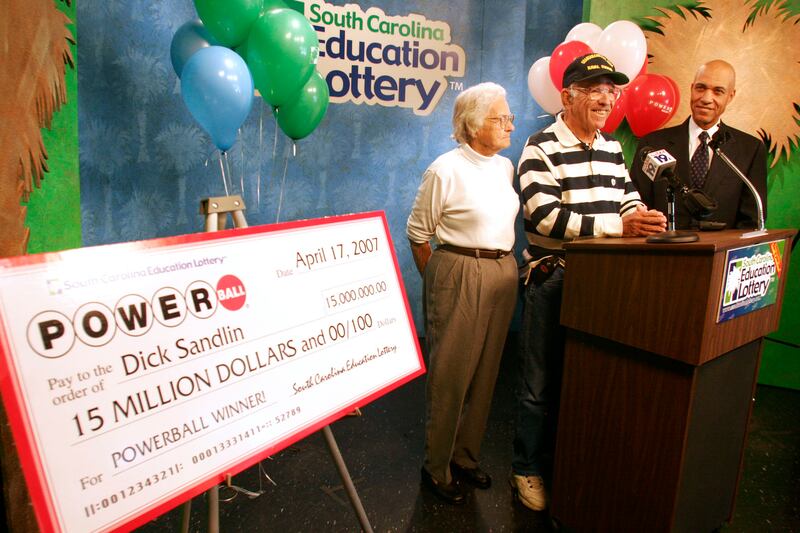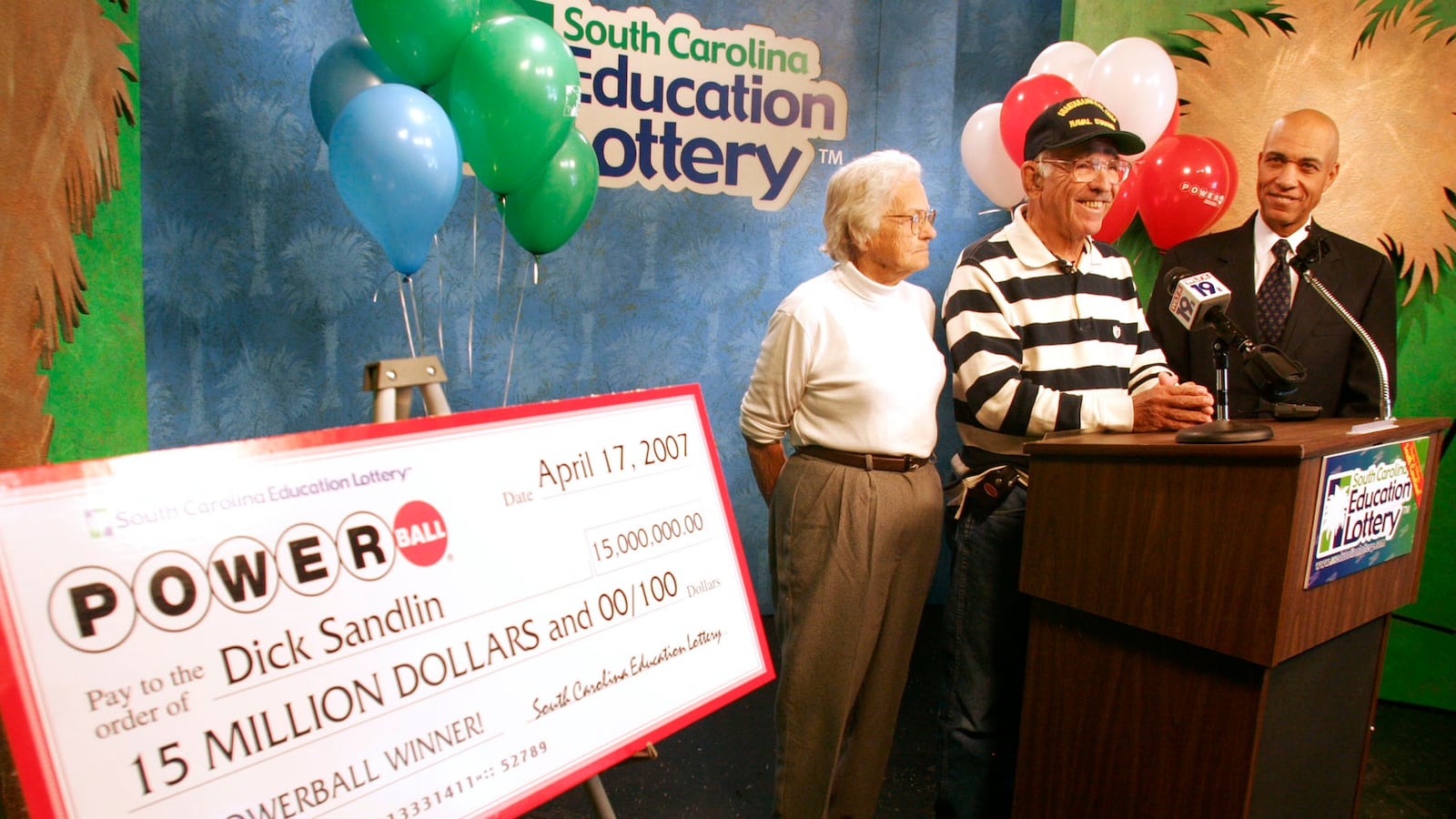The country might be teetering on the edge of a fiscal cliff, but at least one lucky American might soon have nothing to worry about: the winner—or winners—of Wednesday’s record $500 million Powerball jackpot. Sure, you have a one in 175,223,510 chance of winning, but that shouldn’t stop you from gambling $2 of your hard-earned money for a shot at being filthy rich (that $500 million could be even higher by Wednesday night’s drawing, depending on how ticket sales go).
Or should it?
Consider: Your chances of being crushed to death by a vending machine, birthing identical quadruplets or becoming president are actually higher than winning the Powerball pot. Which means you might want to put that $2 toward something you know will have a tangible result, like a granola bar. Also, even if you do win, you will be richer, but you probably won’t be happier. One landmark 1978 study found that lottery winners are no happier than non-lottery winners. In fact, the researchers found that both lottery winners and paralyzed accident victims (who hadn’t won the lottery) were similarly unsatisfied by the simple pleasures that made the control group (non-paralyzed, non-lottery winners) happy. Since then, psychologists are still trying to determine whether winning huge, life-changing sums of money can actually lead to happiness (the answer is usually no). TV specials like the E! Network’s “Curse of the Lottery” show the most dire straits lotto winners can get themselves into, making even playing the lottery look like a worthless—if not dangerous—endeavor.
Now, as another person stands poised to receive more money than they’d ever dreamed of this week, The Daily Beast talks to past Powerball winners to find out what lessons they learned from their own life-changing windfalls.
Name: Philip Pina After-tax winnings: $29.5 million Pre-Powerball Profession: Mechanic Post-Powerball Profession: Mechanic How he shared his loot: Each of his three children and a few nieces and nephews received $12,000. “I helped my family out and everything...but I’m not going to give them $1 million each, they have to go out and earn it.”
A faithful player since the ‘90s, Philip Pina never won more than a few hundred dollars from the lottery—until 2007. Pina almost missed out on his winnings, remembering after throwing the newspaper away that he’d forgotten to check the day’s winning numbers. At first, he kept it under wraps, telling only his wife and family lawyer for the first month, while playing dumb with neighbors and friends who came around asking if he’d won. When he finally claimed his prize, Pina agreed to an interview with an Albuquerque radio station and he headed for New Mexico’s largest city in a limousine, a luxury he’d never been able to afford before. “It was like being a big Hollywood star,” Pina recalls.

He took his winnings in one lump sum and, at the urging of his financial adviser, invested most of it. With the money he didn’t put away, Pina traded in his double-wide trailer for a 3,000-square-foot home and upgraded his shop with a brand new garage. The 62-year-old prides himself on being conservative with his money. Pina says he turned down an appearance on Oprah Winfrey’s show but he did agree to go on a few Univision programs and in 2009 made the “huge mistake” of participating in the ongoing TLC series, “The Lottery Changed My Life.” Ever since it aired, Pina says he and his family routinely receive letters from strangers asking for money to help pay their mortgages, support sick family members, and repay college loans. “I tell everybody that I invested my money in government bonds and just wish them the best of luck,” he said. “If I helped everybody out I’d already be broke. I’m not a god to save every Tom and Dick that calls me up.”
Five years after winning the Powerball, the mechanic still gets up every day and goes to his own automotive shop in Los Ojos, his tiny community outside Chama, N.M. When he’s not working on old cars, Pina takes advantage of his unexpected fortune by traveling all over the country—“it scares me a little to go internationally”—and spending time with his family. “You hear about Powerball winners who go crazy and lose everything. I’m not going to lose it,” he said. “I live comfortably. When I want to go on vacation, I go. I help my daughters, buy my grandkids school supplies and clothes, but everything else is for the future. This is once in a lifetime.”
Name: Barbara Hamer After-tax winnings: $21.5 million Pre-Powerball Profession: Funeral home worker Post-Powerball Profession: Marina owner Most extravagant purchase: Cigar store Indian. "He's still around."
Barbara Hamer, of Leesburg, Ind., didn’t go out and buy anything extravagant when she found out she’d won the Powerball in 1999. She and her husband kept quiet about the news and stayed at their jobs for a week or so before quitting. Their focus was simply staying out of the public eye which, in a town with a population of 555 as of the 2010 census, is no easy task. “It’s not a good place to be,” Hamer told The Daily Beast. “Your heart races for a year. You feel like you’re cast on a very tumultuous wave of euphoria and paranoia.” Four years into early retirement, however, the Hamers got bored, so they opened up a small marina.
Hamer considers herself lucky, not for her winnings, but for close family and friends who helped her get through the post-Powerball stress. She still plays the lottery every once in a while, but not nearly as much as she did before she won. “I hope [the new winners] truly enjoy themselves and the gifts money can give them,” Hamer said. “There is such a big learning curve any time your life takes you in any different type of area. All change is stressful, even good change.” It took Hamer a long time to finally splurge on a new car, but she did get herself a cigar store Indian. “He’s still around,” she says.
Name: Richard Sandlin After-tax winnings: $7.1 million Pre-Powerball Profession: Seasonal state park worker Post-Powerball Profession: Retired Guilty Pleasure: Sandlin still buys a lottery ticket every week.
Kenzie Stout, 18, tells the story of when her grandfather, Richard Sandlin, now 84 years old and deaf, won the Powerball. It was 2007, and the Wilmington, N.C., native was doing seasonal work at a state park. After checking online to confirm that he had the winning numbers, Sandlin first called his family and then went straight to the bank to put the golden ticket in a safety deposit box. He didn’t quit his job for a few months after winning and his most extravagant expenses were updates to his house. Since winning, Sandlin’s wife passed away, and he says he doesn’t do much other than spend time with his daughter and grandchildren, all of whom he’s set up trust funds for. He still buys lottery tickets every week but hasn’t won anything since his lucky break in ‘07.
Name: Bill Poling Winnings over 25 years: $33 million Pre-Powerball Profession: Unemployed Post-Powerball Profession: Philanthropist Prior Winnings: A trip to Disney World in 1983, “back when it was just the Magic Kingdom.”
In 1994, Bill Poling was 36, unemployed and suffering from rheumatoid arthritis. His “nose was always in the want ads,” finding it hard to land a job in Bedford, Ind., a small town of under 14,000. While he wasn’t working, Poling was “an avid sweepstaker,” subscribing to a sweepstakes newsletter and even winning a trip to Disney World in 1982—“back when it was just the Magic Kingdom.” But he never won anything really big until 1994 when he became the lucky recipient of the $33 million Powerball prize, which he chose to receive in annual installments rather than all at once. Suddenly, the medical bills that once plagued Poling were no longer an issue. He was able to pay for his own health care as well as his mother’s until she died in 2002. Poling lives in the same house he grew up in which, though still unassuming from the street, is much bigger now. He’s also become quite the local philanthropist. A devout Christian, he purchased land to help build a new Baptist church, donated to the Arthritis Foundation, the local Girl and Boy Scout troops, and the town Girls' Club among others. Poling isn’t married—“thankfully”—and he doesn’t have children, so his money will go to his many cousins and his church. “It was a godsend for me,” said Poling of his fortune. “I don’t know what the heck I’d have done if I hadn’t won that money.”
Name: Patrick Nowlin After-tax winnings: $19 million Pre-Powerball Profession: Retired Post-Powerball Profession: Retired Good Samaritan Story: Nowlin helped his hometown pay for its July 4th fireworks display this past summer, after the community had fallen on hard economic times.
It could have been a prank. Patrick Nowlin discovered that his was the winning Powerball ticket on April 1, 2007. It was a Sunday morning, so after finishing their coffee, Nowlin and his wife spent the rest of the day discussing how they would spend their money. Nowlin was adamant about keeping his big news a secret from the 15,000 other people in Stoughton, Wisc. He and his wife held secret meetings with their lawyer and a financial adviser for the next two months. He didn’t even clue his son into what was happening until a week before going public. After 33 years of working in a factory, Nowlin had developed a hereditary eye disease called Retinitis pigmentosa. When he turned 55 he was eligible for Social Security and disability so he retired in 2002, five years before winning the Powerball. Nowlin’s wife was working at Wal-Mart at the time, where she had been for 19 years. Instead of quitting right away, she decided to stay for one more year to earn the 20-year status which she says came with a paid vacation and a raise. “I was living on Social Security; I had my house paid off and no outstanding loans and money in a 401(k). I was doing pretty good before I won the lottery,” Nowlin clarifies. Still, $19 million extra in cash doesn’t hurt.
After making sure that his now-35-year-old diabetic son was taken care of, Nowlin and his wife created a $2 million grant for the University of Wisconsin’s Children’s Diabetes Wing. Like other winners, he learned early on that nontaxable gifts are capped at $12,000, so in addition to setting up a trust fund for his son and siblings, he also bought them each a $12,000 car. While his family is grateful, Nowlin has been put in the uncomfortable position of saying “no” to solicitations for money, and they don’t always come from people he knows. He has a shoe box called the Lottery File that’s filled with letters from people looking for handouts. “I don’t respond to them at all. Why would I?”
A Vietnam veteran, Nowlin is also the commander of his local VFW post. Now that he is unable to ride his own motorcycle, he enjoys riding in the back of Harley Davidson three-wheel trike while one of his friends drives, and traveling the world. “I want to see as much as I can while I can still see something,” he said.
Name: Natividad Doyle Winnings over 25 years: $7.1 million Pre-Powerball Profession: House cleaner Post-Powerball Profession: Retired Unlucky Numbers: A faulty machine forced Doyle to give up her favorite numbers and go with random ones.
Natividad Doyle was one of the original Powerball winners, claiming her $7.1 million prize in 1992, the year the games began. Doyle had come from the Philippines to Fort Wayne, Ind., by way of Missouri and was cleaning houses for a living when she won. She and her husband, who worked at a General Motors plant, were regular lottery players and always used the same numbers, but on this particular occasion, the machine at the grocery store malfunctioned and Doyle had to accept a ticket with random numbers. The combination ended up being luckier than she’d expected. Doyle quit her job immediately, but her husband stuck it out at GM a little while longer before retiring early. The couple stayed in Fort Wayne and decided to take their winnings over a 25-year period.






